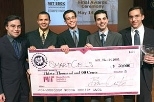A life sciences team won the MIT $50K Entrepreneurship Competition for the fifth year in a row on Wednesday, May 14.
SmartCells was selected as the $30,000 grand prize winner. NeuroBionics and Brontes were the runners-up, receiving $10,000 each.
"The life sciences teams in recent years have tended to be very cross-disciplinary," said Mike Grandinetti, a $50K judge, lecturer at the Sloan School of Management and entrepreneur. Teams' success is often credited to an interdisciplinary makeup--technology and management students working together.
"Each of the winning teams had a piece of technology that was very well-defined and fairly well-demonstrated," said David Stone, another $50K judge and managing director at Flagship Ventures.
SmartCells, the the Robert P. Goldberg Grand Prize winning team, delivered a business plan for a once-a-day, self-regulating insulin delivery system for diabetics. The technology uses a new kind of biodegradable polymer to produce stimuli-responsive nanoparticles for controlled drug delivery. Team members are Sloan school students Robert Bruch and John Hebert; Todd Zion, an MIT doctoral student in chemical engineering; and Martin Curiel and Tsafrir Vanounou, both students at Harvard Business School.
NeuroBionics, was a runner-up for what the team calls its "pacemaker for the brain," devices that can be used to treat disorders such as Parkinson's, epilepsy, obesity and depression. The technology uses a self-regulating system with implanted electrical stimulation and minimally invasive stimulation.
The Brontes team was recognized for its low-cost, real-time 3-D camera system that transforms standard 2-D instruments (still and motion cameras, microscopes, endoscopes) into high-performance 3-D devices.
Eight finalist teams were chosen from 118 entrants. Judges, including venture capitalists and entrepreneurs, selected the winning teams based on their potential of becoming "tomorrow's leading firms." The $50K competition has launched more than 75 companies, including Akamai Technologies (NASDAQ: AKAM) and other companies acquired by the likes of Microsoft, Motorola and Broadcom.
Finalist teams presented their plans to an audience of venture capitalists and business leaders at the final awards in Kresge Auditorium.






